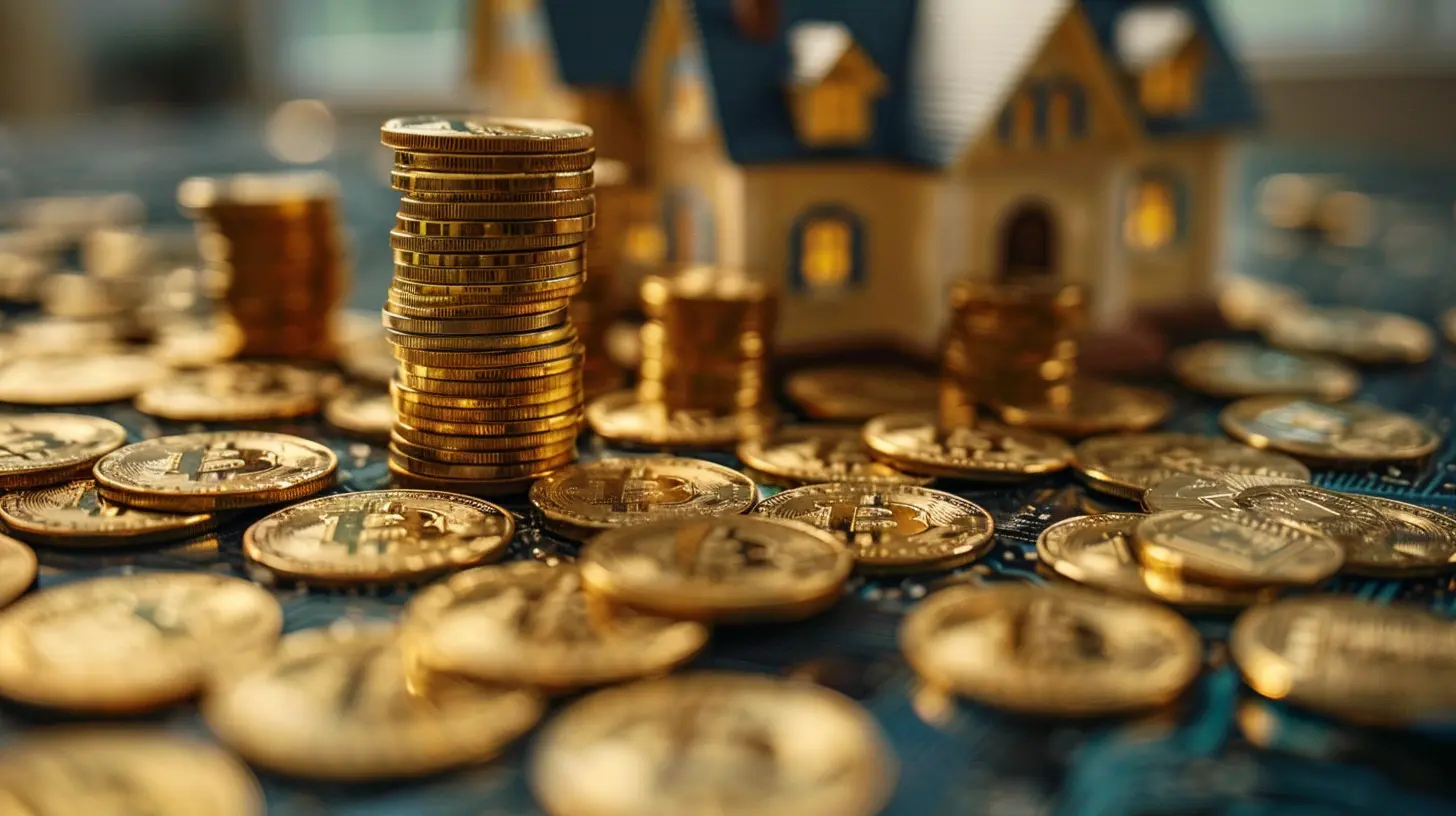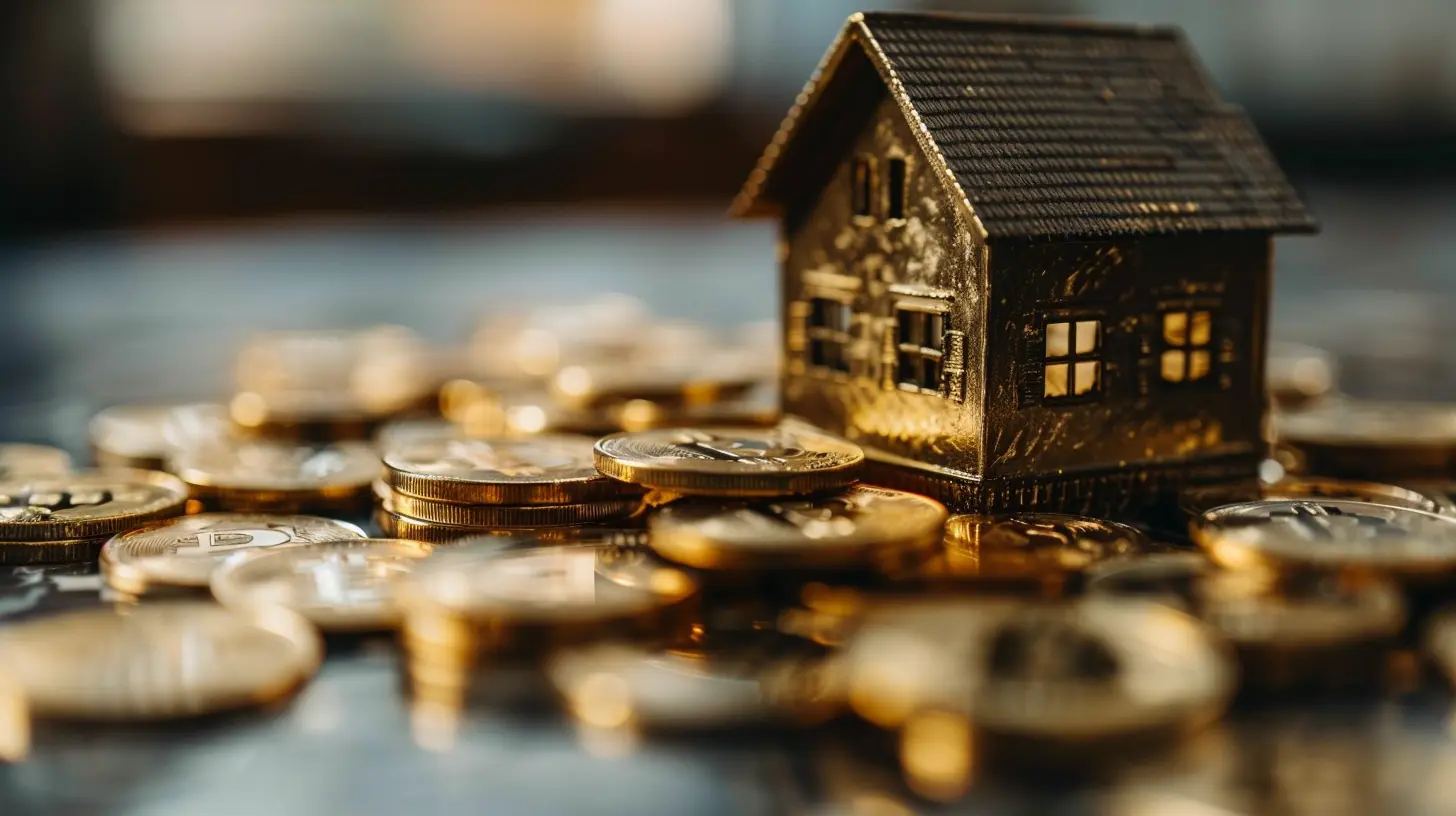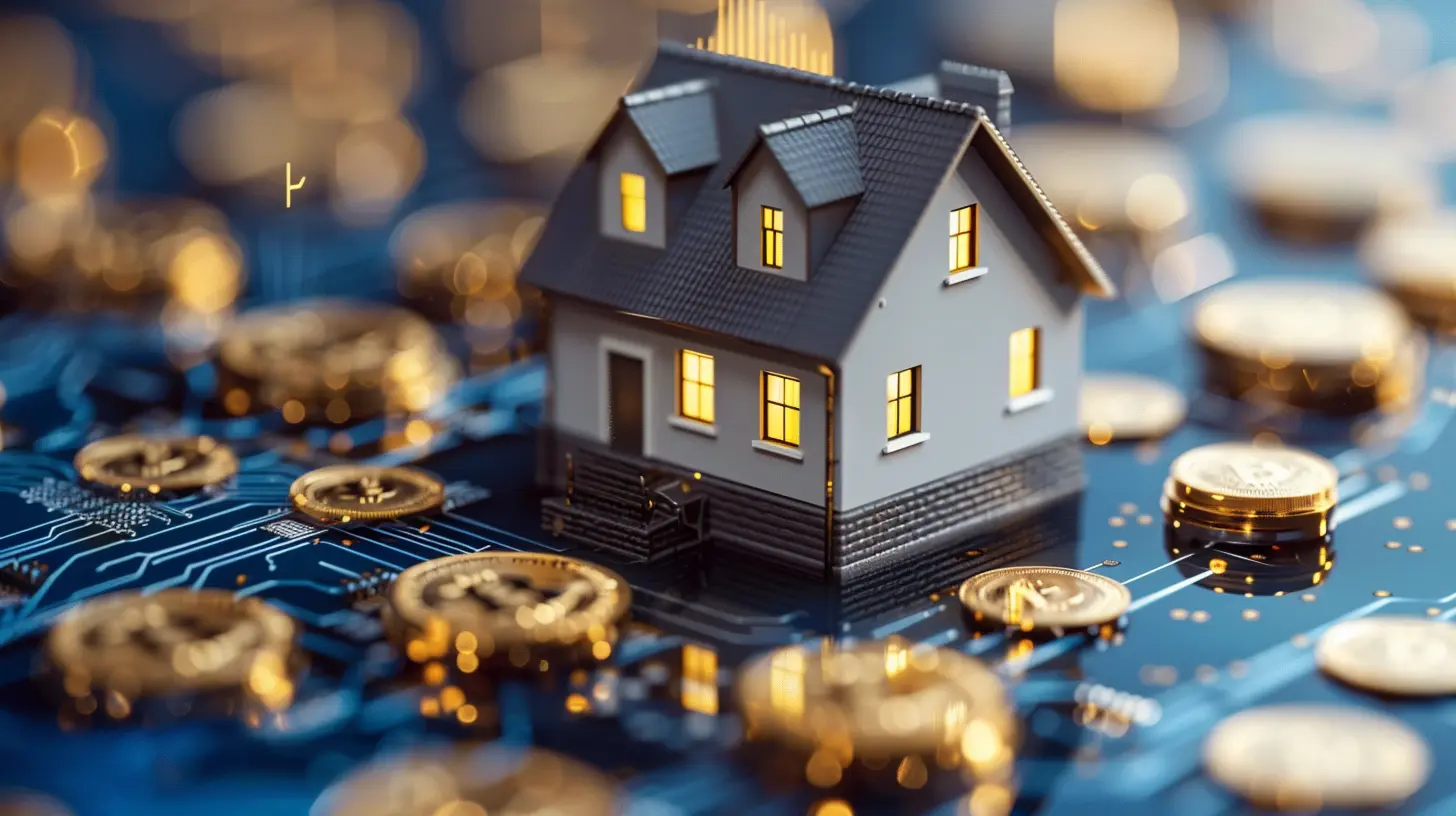Blockchain and Real Estate: Tokenizing Property Ownership
2 February 2025
Real estate has always been a bit of a dinosaur when it comes to innovation. Don't get me wrong, the property market is one of the most lucrative industries out there, but let's face it—it operates with systems that are well overdue for a tech upgrade. Enter blockchain technology and the concept of tokenizing property ownership. It’s like what the internet did to shopping—totally revolutionizing the game.
So, what exactly does this intersection of blockchain and real estate mean? How does tokenizing property ownership work? And more importantly, why should you care? In this detailed guide, we'll walk through what blockchain is doing to disrupt the traditional real estate industry, the benefits, the challenges, and what the future might hold for tokenized property ownership.

What is Blockchain, and Why Should Real Estate Care?
Before we dive into tokenization, let’s quickly talk about blockchain. Think of blockchain as a digital ledger that records transactions in a way that is transparent, secure, and decentralized. Each transaction is stored in a "block," and these blocks are chained together—hence, blockchain.Now, you might be thinking, “Okay, but what does that have to do with real estate?” Well, blockchain can streamline many of the clunky, outdated processes in real estate. From property transfers to verifying ownership, the technology makes it quicker, more transparent, and a lot less expensive.
But wait, there's more! Blockchain isn't just about making the process smoother. It's also enabling a whole new way to own and invest in property—through tokenization.

Understanding Tokenization
Let’s break down tokenization in simple terms. Tokenization is the process of converting the value of a tangible asset, like real estate, into digital tokens. These tokens live on the blockchain and represent a share of ownership in the asset.Imagine buying a house. Traditionally, you'd either buy it outright or get a mortgage and make payments over time. But with tokenization, you don't have to buy an entire property to get in on the action. Instead, you could buy a "token" that represents a fraction of the property. It’s like owning a slice of the pie without needing to eat the whole thing.
How Does Tokenizing Property Work?
Let’s say a property is worth $1 million. The owner decides to tokenize the property by issuing 1,000 tokens, with each token representing 0.1% ownership in the property. If you buy one token, you now own a small piece of that property—without needing to go through the hassle of a mortgage, loan, or traditional real estate paperwork.This makes real estate investments far more accessible to people who might not have the capital to buy an entire property. Plus, unlike traditional real estate, which can take months to sell, you can easily trade your tokens anytime on blockchain platforms, just like you would with stocks.

Benefits of Tokenizing Property Ownership
Alright, so tokenization sounds cool, right? But what are the real-world benefits? Why would someone want to tokenize a property, and why should investors care?1. Increased Liquidity
One of the biggest challenges in real estate is liquidity. If you own a property, selling it can take months, and that's if everything goes smoothly. Tokenizing a property changes that. Suddenly, you're dealing with a far more liquid asset because you can sell your tokens easily on a blockchain exchange. No more waiting around for the perfect buyer to show up!2. Lower Barriers to Entry
Traditionally, investing in real estate requires a significant upfront investment—think down payments, closing costs, and more. Tokenization lowers these barriers. You don’t need to save up thousands of dollars to get started. With tokenization, you can invest in real estate with just a few hundred dollars or even less, depending on how the tokens are structured. It’s democratizing real estate, making it accessible to everyday investors.3. Transparency and Security
Blockchain technology is inherently transparent. Every transaction is recorded on the blockchain and can be viewed by anyone. This reduces the chances of fraud and ensures that ownership records are accurate and immutable.Not only does this enhance trust, but it also provides a more secure way of managing property ownership. When everything is on the blockchain, there’s less room for error, miscommunication, or shady dealings.
4. Fractional Ownership
With tokenization, you can own a small piece of a property. This is especially appealing for people who want to diversify their investments without putting all their money into one asset. Fractional ownership also means you can invest in high-value properties that would otherwise be out of reach, like commercial real estate or luxury homes.5. Global Reach
Tokenized real estate can be traded globally. You’re no longer limited by geography. Whether you're in New York, Tokyo, or London, you can invest in real estate anywhere in the world with just a few clicks. The world becomes your real estate playground.
Real-Life Examples of Tokenized Real Estate
This all sounds great in theory, but are there real-world examples of tokenized real estate? You bet there are.1. Aspen Digital
In 2018, the St. Regis Aspen Resort in Colorado was tokenized, allowing investors to buy shares in the luxury hotel. This was one of the first high-profile examples of tokenized real estate, and it opened the door to more properties being tokenized in the future.2. Harbor Platform
Harbor, a blockchain platform, tokenized a $100 million real estate fund in 2019. The tokens represented ownership in a portfolio of real estate assets, allowing investors to buy and sell shares in the fund through blockchain technology.3. Slice (Formerly Slice Capital)
Slice is a platform that enables fractional ownership in commercial real estate through tokenization. Investors can buy tokens that represent ownership in properties, with the ability to trade their tokens on the blockchain.Challenges and Risks of Tokenized Real Estate
Of course, it's not all sunshine and rainbows. While tokenizing property ownership offers many benefits, there are still some challenges and risks to consider.1. Regulation
Real estate is a highly regulated industry, and blockchain is still relatively new. There’s a lot of uncertainty around how governments will regulate tokenized real estate. Will tokens be treated like securities? Will there be new tax laws? These are all questions that have yet to be fully answered.2. Market Volatility
The crypto world is known for its volatility, and tokenized real estate is no exception. The value of your tokens could fluctuate wildly, especially if they’re traded on public exchanges. While real estate itself tends to be a stable investment, the tokenized version may experience more market swings.3. Liquidity Isn’t Guaranteed
While tokenized real estate offers the potential for increased liquidity, it’s not a sure thing. If there aren’t enough buyers for your tokens, you could still end up holding onto them longer than you’d like. Liquidity depends on market demand, and in a slow market, you might face difficulties selling your tokens.4. Security Concerns
Even though blockchain is generally secure, it’s not immune to hacking. If a platform that holds your tokens gets hacked, you could lose your investment. It’s crucial to use reputable platforms and take necessary security precautions, like using hardware wallets to store your tokens.
The Future of Real Estate and Blockchain
Despite the challenges, the potential for tokenized real estate is huge. As blockchain technology matures and regulations become clearer, we could see a massive transformation in how people buy, sell, and invest in property.Tokenization could also make real estate more inclusive. Imagine a world where anyone, anywhere, can invest in real estate with just a few dollars. People from all walks of life could participate in the wealth-building opportunities that real estate offers, without needing to be a millionaire to get started.
But will tokenization replace traditional real estate? Probably not, at least not anytime soon. Instead, it will likely coexist with the current system, offering an alternative way to invest in property. Think of it as another tool in the real estate toolbox.
Final Thoughts
Blockchain and tokenization are shaking up the real estate industry in ways we never thought possible a few years ago. By making property ownership more accessible, transparent, and efficient, tokenization is poised to democratize real estate and open the doors to a new generation of investors.Is it the future of real estate? Only time will tell. But one thing’s for sure—blockchain is here to stay, and it's going to keep pushing the boundaries of what's possible in the world of property ownership.
all images in this post were generated using AI tools
Category:
Blockchain TechnologyAuthor:

Michael Robinson
Discussion
rate this article
21 comments
Graham Matthews
Interesting potential for blockchain; challenges in regulation and adoption remain.
March 5, 2025 at 8:26 PM

Michael Robinson
Thank you for your insight! Indeed, while blockchain offers exciting opportunities for real estate, navigating regulatory frameworks and fostering widespread adoption will be key to its success.
Leo McCoy
This article beautifully highlights the transformative potential of blockchain in real estate. Tokenizing property ownership not only enhances transparency but also democratizes access, paving the way for a more inclusive market. Exciting times ahead!
March 4, 2025 at 11:35 AM

Michael Robinson
Thank you for your insightful comment! I'm glad you found the potential of blockchain in real estate so compelling. Exciting times indeed!
Marni Underwood
Exciting times ahead! Tokenizing property ownership could revolutionize real estate investment and accessibility.
February 24, 2025 at 8:40 PM

Michael Robinson
Absolutely! Tokenization can significantly enhance liquidity and broaden access to real estate investments, making it more inclusive for everyone.
Maverick McGowan
This article opens up fascinating possibilities for the future of real estate! Tokenizing property ownership could revolutionize access and investment. I’m excited to see how blockchain technology will reshape traditional real estate transactions!
February 23, 2025 at 1:35 PM

Michael Robinson
Thank you for your insights! We're equally excited about the potential of blockchain to transform real estate by enhancing access and investment opportunities.
Runevale Martin
Ah yes, because who wouldn’t want to trade their cozy home for a handful of digital tokens? Nothing says “security” like putting your life savings into a blockchain. Forget traditional contracts; let’s just hope the Wi-Fi holds up when I want to sell my house!
February 21, 2025 at 11:20 AM

Michael Robinson
I appreciate your concerns! While blockchain has its risks, it also offers innovative solutions for transparency and efficiency in real estate transactions.
Juliet Riggs
This article effectively highlights how blockchain technology can revolutionize real estate by enabling the tokenization of property ownership. By enhancing transparency and liquidity, it offers a promising solution to traditional challenges in property transactions. Great insights!
February 19, 2025 at 7:17 PM

Michael Robinson
Thank you for your positive feedback! I'm glad you found the insights on blockchain's potential in real estate valuable.
Zachary Fry
Tokenizing property ownership simplifies transactions and increases accessibility in real estate.
February 18, 2025 at 1:06 PM

Michael Robinson
Absolutely! Tokenizing property ownership indeed streamlines transactions and opens up real estate investment to a broader audience, enhancing liquidity and accessibility in the market.
Matteo McDermott
Tokenizing property ownership could redefine accessibility, transparency, and trust in real estate transactions.
February 17, 2025 at 9:57 PM

Michael Robinson
Absolutely! Tokenizing property ownership enhances accessibility by lowering investment barriers, increases transparency through immutable records, and fosters trust with secure transactions.
Zevon Clarke
Revolutionizing ownership, enhancing transparency greatly.
February 17, 2025 at 4:05 AM

Michael Robinson
Thank you! We're excited about how blockchain can transform property ownership and increase transparency in real estate transactions.
Allison McHugh
This article effectively highlights the potential of blockchain in real estate. Tokenizing property ownership could streamline transactions and increase accessibility, but challenges around regulation and adoption remain significant.
February 16, 2025 at 12:07 PM

Michael Robinson
Thank you for your insightful comment! You raise important points about the potential of blockchain to transform real estate, while also acknowledging the regulatory hurdles we must navigate.
Aleta McCoy
Great insights on the intersection of blockchain and real estate! Tokenizing property ownership could revolutionize access and investment in real estate, making it more inclusive. Excited to see how this technology evolves!
February 14, 2025 at 12:52 PM

Michael Robinson
Thank you! I'm glad you found it insightful. The potential for blockchain to transform real estate ownership is indeed exciting!
Romina Russell
Great insights! Tokenizing property ownership could really simplify transactions and make real estate more accessible. Excited to see future developments!
February 13, 2025 at 9:57 PM

Michael Robinson
Thank you! I'm glad you found the insights valuable. Exciting times ahead for real estate with blockchain!
Rocket Sullivan
Exciting times ahead! Tokenizing property ownership with blockchain opens endless possibilities for accessibility and investment in real estate. Let’s embrace the future of property transactions! 🎉🏡
February 11, 2025 at 9:22 PM

Michael Robinson
Absolutely! Tokenizing property ownership truly revolutionizes real estate, making it more accessible and efficient for everyone. Excited to see where this takes us!
Ford Horne
This article thoughtfully illuminates the potential of blockchain in revolutionizing real estate through tokenization. While the benefits are promising—enhancing liquidity and democratizing access—it's crucial to address regulatory hurdles and market readiness. A balanced approach will be essential for successful implementation in this complex industry.
February 10, 2025 at 4:04 AM

Michael Robinson
Thank you for your insightful comment! I completely agree that addressing regulatory challenges and ensuring market readiness are vital for the successful implementation of blockchain in real estate tokenization. Your perspective highlights the importance of a balanced approach in this evolving landscape.
Kassandra Gray
Tokenizing property ownership could revolutionize real estate, but let’s hope it doesn’t turn into a blockchain boondoggle where hype overshadows the tangible benefits.
February 7, 2025 at 4:34 AM

Michael Robinson
Absolutely, it’s crucial to focus on real-world applications and benefits to ensure that tokenization enhances the real estate market rather than detracts from it.
Roxanne McAdams
Great insights on the potential of blockchain in real estate! Tokenization could revolutionize property ownership and investment.
February 5, 2025 at 7:59 PM

Michael Robinson
Thank you! I'm glad you found the insights valuable. Tokenization indeed has the power to transform real estate investment and ownership dynamics.
Elara King
Tokenizing property ownership via blockchain can revolutionize real estate by enhancing liquidity, transparency, and accessibility. This shift empowers investors and democratizes access, reshaping the traditional market landscape for future generations.
February 5, 2025 at 12:38 PM

Michael Robinson
Absolutely! Tokenizing property ownership via blockchain offers transformative benefits like improved liquidity, transparency, and democratized access, ultimately reshaping the real estate market for future generations.
Zadie McHugh
This article offers valuable insights into the potential of blockchain technology for real estate. While tokenization can streamline transactions and increase accessibility, challenges such as regulation and market adoption remain.
February 5, 2025 at 4:14 AM

Michael Robinson
Thank you for your insightful comment! You’re absolutely right—while blockchain and tokenization present exciting opportunities for real estate, addressing regulatory and adoption challenges is crucial for their success.
Fable Watson
Tokenizing property ownership on the blockchain revolutionizes real estate by enhancing liquidity and accessibility, yet invites questions about regulations, security, and the essence of ownership in a digital age.
February 4, 2025 at 7:15 PM

Michael Robinson
Thank you for your insightful comment! You raise essential points about liquidity, accessibility, and the regulatory landscape surrounding blockchain in real estate. Addressing these aspects is crucial for the successful integration of tokenization in the industry.
Kimberly Butler
Tokenizing property ownership through blockchain could redefine real estate by enhancing transparency and accessibility. However, it raises profound questions about value, ownership, and the implications for traditional market dynamics in an increasingly digital landscape.
February 4, 2025 at 4:42 AM

Michael Robinson
Thank you for your insightful comment! You raise important points about the potential of blockchain to transform real estate while also highlighting the need for a deeper exploration of its impact on value and traditional market structures.
Lark McSweeney
The article effectively highlights blockchain's potential to revolutionize real estate ownership through tokenization, yet it overlooks the regulatory challenges and market adoption hurdles that could impede progress.
February 3, 2025 at 4:19 AM

Michael Robinson
Thank you for your comment! You're right; the regulatory challenges and market adoption hurdles are critical factors that warrant further exploration in the discussion of blockchain's impact on real estate. I appreciate your insight!
MORE POSTS

Exploring the World of Underwater Photography with Digital Cameras

Key Challenges Tech Startups Face and How to Overcome Them

The Best Foldable Tablets for Work and Play

How Wearable Tech is Enabling Remote Healthcare

Understanding Robot Ethics: Challenges and Solutions

Exploring the Ethical Dilemmas of Virtual Reality in the Justice System

The Best Digital Camera Settings for Capturing Fireworks

How to Build a Strong Tech Startup Culture from the Ground Up

The Science Behind Wind Turbine Blade Design and Efficiency

Navigating the Tech Startup Ecosystem: A Founder’s Guide

The Role of Government Policy in Supporting Tech Startups

Esports Career Pathways: From Player to Content Creator

How Robotics is Transforming the Entertainment Industry